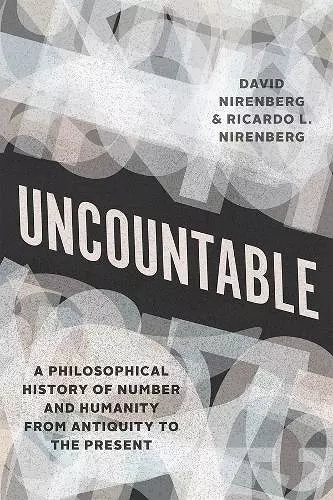Uncountable
A Philosophical History of Number and Humanity from Antiquity to the Present
David Nirenberg author Ricardo L Nirenberg author
Format:Paperback
Publisher:The University of Chicago Press
Published:9th May '24
Should be back in stock very soon

Ranging from math to literature to philosophy, Uncountable explains how numbers triumphed as the basis of knowledge—and compromise our sense of humanity.
Our knowledge of mathematics has structured much of what we think we know about ourselves as individuals and communities, shaping our psychologies, sociologies, and economies. In pursuit of a more predictable and more controllable cosmos, we have extended mathematical insights and methods to more and more aspects of the world. Today those powers are greater than ever, as computation is applied to virtually every aspect of human activity. Yet, in the process, are we losing sight of the human? When we apply mathematics so broadly, what do we gain and what do we lose, and at what risk to humanity?
These are the questions that David and Ricardo L. Nirenberg ask in Uncountable, a provocative account of how numerical relations became the cornerstone of human claims to knowledge, truth, and certainty. There is a limit to these number-based claims, they argue, which they set out to explore. The Nirenbergs, father and son, bring together their backgrounds in math, history, literature, religion, and philosophy, interweaving scientific experiments with readings of poems, setting crises in mathematics alongside world wars, and putting medieval Muslim and Buddhist philosophers in conversation with Einstein, Schrödinger, and other giants of modern physics. The result is a powerful lesson in what counts as knowledge and its deepest implications for how we live our lives.
“Erudite. . . . it draws on science, philosophy, and history, with frequent detours into literature. Balzac, Nabokov, Kafka, and other literary giants are enlisted to endorse the message that certain things ‘can’t be grasped by counting, statistics, or any logical or scientific analysis.’ Moreover, by ‘opting to attend only to the countable . . . we do violence not only to the objects of our thought but also to our own being.’ This claim lacks a clear definition of violence, but it is the first step towards overthrowing ‘the tyranny of axioms.’”
* Times Literary Supplement *"This book offers a fascinating series of sophisticated and insightful reflections on the many ways the appraisal of numbers has shaped culture and civilization. . . . [It] will yet be an intellectual treat for anyone who may delight in original philosophical musings without having to cross Greco-Abrahamic borders." * Choice *
“Ricardo and David Nirenberg, father and son scholars of mathematics and history, have teamed up in a breathtaking voyage examining the foundations and limits of knowledge in western thought. Not content with secondary sources, they have translated from the literature in their original languages: Arabic, French, German, Greek, Hebrew, Italian, Latin, and Spanish. In particular, they target mathematics and the natural sciences, and the way the concepts of sameness and differences affect our understanding of the natural world. But in the process, the authors touch upon many other facets of human endeavor, all named after their Greek roots: poetry, philosophy, psychology, economy. Along this wildly entertaining journey, we meet dozens of erudite thinkers, scientists, and writers such as Anaximander, Al-Fārābī, Fyodor Dostoevsky, Ludwig Wittgenstein, Werner Heisenberg, and Rainer Maria Rilke. The book arrives just in time to give us ammunition as attempts are being made to put truth itself into the supercollider. It is a source of inspiration and comfort to learn how the far-flung ideas about numbers, our existence, and the world we live in have been debated in the past.” -- Joachim Frank, Columbia University, Nobel Prize in Chemistry
“This is an erudite and insightful exploration of the collision between two distinct ideas: sameness and difference. The authors brilliantly unify wide-ranging bodies of thought across millennia around this theme. They forcefully and eloquently demonstrate why this dichotomy matters today and how deeply it shapes our vision of the world and the actions we take.”
-- James J. Heckman, the Henry Schultz Distinguished Service Professor of Economics at the University of Chicago, Nobel Memorial Prize in Economics
"Drawing on a broad range and telling selection of examples from economics, quantum physics, literary studies, and more, the Nirenbergs combine their strength as a professional medievalist and a mathematician, respectively, to take the reader on a guided, remarkably enthralling tour through the universe and universals of formalization. Beautifully and engagingly written, this book will greatly appeal to a wide, interested reading public and change the critical terms of debate regarding mathematical versus other forms of reasoning in the natural, social, and human sciences as well as literature and the arts, even ordinary life, for years to come." -- Hent de Vries, the Paulette Goddard Professor of the Humanities, New York University
“Uncountable is erudite, imaginative, and articulate as well as existentially relevant, even revelatory. David and Ricardo L. Nirenberg trace the epistemic habits, ideals, and practices that over millennia have presumed the knowledge of numerical relations to be the only true knowledge and numbers the only true form of being. The result is a philosophical and poetic exhortation to take responsibility for knowledge.” -- Chad Wellmon, author of Permanent Cr
ISBN: 9780226828367
Dimensions: 229mm x 152mm x 30mm
Weight: 567g
432 pages